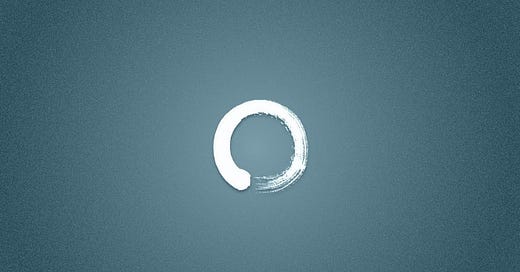Zen Koans for Everyday Intro+ First Koan: Every Day is a Good Day
A Practice with Koans from the book, "Zen Koans" by Rev. Gyomay Kubose
A Zen koan is, in essence, a problem that can’t be solved by the intellect. In trying to understand it, you run up against the limitations of thought and, hopefully, tap into a direct and non-verbal awareness of reality.
Koans plumb a dimension deeper than the five senses that keep us attached to things, conditions, and concepts—preventing us from being aware and resilient in the face of challenge and change.
We typically intellectualize and conceptualize our life. When we do that, we shackle ourselves to concepts. Concepts seem so real that our mind gets confused about whether it’s a concept or an absolute. These concepts harden like concrete, keeping our minds trapped and our forward momentum stuck.
We may classify or conceptualize certain people as “trouble” or “wrong” or “bad.” We may categorize a task or activity as “beneath us” or “too hard.” Once that concept has repeated in our thoughts long enough, then that person IS trouble for us … the project impossible.
Our minds have become victims to those perspectives and we freeze that person into a characterization, a concept, rather than a living being capable of change. And no task is beneath us, really. If a task that is a part of our job or our family life and it needs doing, then it is our responsibility to life to do it.
As part of my practice, I am repackaging and sharing koans from Rev. Gyomay Kubose’s book, Zen Koans, as brief posts offering a different way for you to view and respond to your life. Sometimes a new way of looking at things can help you solve a problem with your family, your work, or in dealing with the stresses of our over-stimulated, divisive, and stressful times—by bringing a new, more positive energy to the challenge.
Calligraphy on scroll reading, “Nichi, Nichi, Kore, Ko, Jitsu” meaning “every day is a good day.”
Today’s koan is “Every Day Is a Good Day” by Unmon:
Unmon said: “I do not ask you about fifteen days ago. But about fifteen days hence? Come, say a word about this!” Since none of the monks answered, he answered for them: “Every day is a good day.”
Is every day a good day? I can hear the resounding chorus now. “No!” you answer. Every day is certainly not a nice or easy day, as in compared to a bad day. Every day is THE absolute day. It is the ONLY day you have right now, so that’s good. It doesn’t repeat. It’s brand new and fresh.
The goodness of today is that it IS the absolute day you have to live right now. Rain, shine, sickness, health, angry boss, family arguments, or social/political unrest and stress.
The day itself is not bad or good. All days are the absolute day; all days are good days. Only the concepts we hold about circumstances as bad—the rain or the angry boss—and our expectations—make us label the day as bad, in comparison to our expectations.
We are the ones that turn our days into bad days. The day has nothing to do with it.
Yesterday or last week is only a reference. Tomorrow or next week is a hope. Rain or sunshine is a natural condition. An angry boss or promotion is only a circumstance. It is up to us to not freeze the conditions or circumstances of life into reality. When we do, we are the ones that have made our days bad days.
Consider subscribing to receive the
Everyday Buddhism Substack, the special “Zen Koans for Eveyday” posts, and the
“Words From My Teachers” podcast … at a
reduced price of $5/month or $40/annually.
And for those already subscribed to the paid version, thank you!
Don’t forget to recommend it to your friends and family … Or gift them a subscription!





Thanks for sharing. I became a Buddhist about a year and a half ago, and I'm super glad I did. It's healing me deeply.